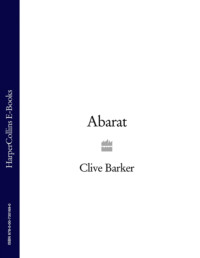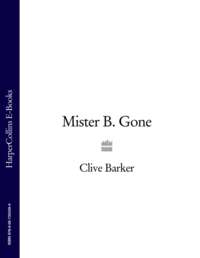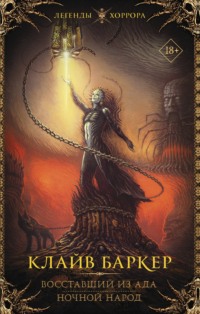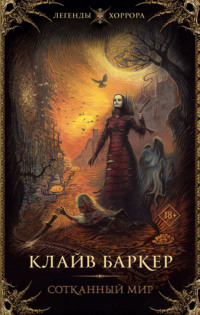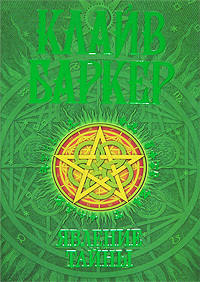
Полная версия
The Great and Secret Show
‘I don’t exactly know. He’s been odd since –’
She was going to say since yesterday, but she’d seen a canker in his beauty moments ago that must have been there always, except that she – like the rest of the world – had been too dazzled to recognize it.
‘Does he need help?’ Howie asked.
‘I think it’s better we let him go.’
‘Jo-Beth!’ somebody called. A middle-aged woman was striding towards them, both dress and features plain to the point of severity.
‘Was that Tommy-Ray?’ she said as she approached.
‘Yes it was.’
‘He never stops by any longer.’ She had come to a halt a yard from Howie, staring at him with a look of mild puzzlement on her face. ‘Are you coming to the store, Jo-Beth?’ she said, not looking away from Howie. ‘We’re already late opening.’
‘I’m coming.’
‘Is your friend coming too?’ the woman asked pointedly.
‘Oh yes … I’m sorry … Howie … this is Lois Knapp.’
‘Mrs,’ the woman put in, as though her marital status were a talisman against strange young men.
‘Lois … this is Howie Katz.’
‘Katz?’ Mrs Knapp replied. ‘Katz?’ She removed her gaze from Howie, and studied her watch. ‘Five minutes late,’ she said.
‘It’s no problem,’ Jo-Beth said. ‘We never get anyone in before noon.’
Mrs Knapp looked shocked at this indiscretion.
‘The Lord’s work is not to be taken lightly,’ she remarked. ‘Please be quick.’ Then she stalked off.
‘Fun lady,’ Howie commented.
‘She’s not as bad as she looks.’
‘That’d be difficult.’
‘I’d better go.’
‘Why?’ Howie said. ‘It’s a beautiful day. We could go someplace. Make the most of the weather.’
‘It’ll be a beautiful day tomorrow, and the day after, and the day after that. This is California, Howie.’
‘Come with me anyway.’
‘Let me try to make my peace with Lois first. I don’t want to be on everyone’s hit list. It’ll upset Momma.’
‘So when?’
‘When what?’
‘When will you be free?’
‘You don’t give up, do you?’
‘Nope.’
‘I’ll tell Lois I’m going back home to look after Tommy-Ray this afternoon. Tell her he’s sick. It’s only half a lie. Then I’ll come by the motel. How’s that?’
‘Promise?’
‘Promise.’ She began to move away, then said: ‘What’s wrong?’
‘Don’t want to … kiss … kiss me in public, huh?’
‘Certainly not.’
‘How about private?’
She half-heartedly shushed him as she backed away.
‘Just say yes.’
‘Howie.’
‘Just say yes.’
‘Yes.’
‘See? It’s real easy.’
In the late morning, as she and Lois sat sipping ice water in the otherwise deserted store, the older woman said:
‘Howard Katz.’
‘What about him?’ Jo-Beth said, preparing herself for a lecture on behaviour with the opposite sex.
‘I couldn’t think where I knew the name from.’
‘And now you remember?’
‘A woman who lived in the Grove. ’Way back,’ she said, then turned her attention to wiping a ring of water from the counter with her napkin. Her silence, and the effort she gave to this minor mopping, suggested she was happy to let the subject drop if Jo-Beth chose not to pursue it. Yet she’d felt obliged to raise the issue. Why?
‘Was she a friend of yours?’ Jo-Beth asked.
‘Not of mine.’
‘Of Momma’s?’
‘Yes,’ Lois said, still mopping, though the counter was dry.
‘Yes. She was one of your momma’s friends.’
Suddenly, it came clear.
‘One of the four,’ Jo-Beth said. ‘She was one of the four.’
‘I believe she was.’
‘And she had children?’
‘You know, I don’t remember.’
This was the closest a woman of Lois’s scrupulousness came to lying. Jo-Beth called her on it.
‘You remember,’ she said. ‘Please tell me.’
‘Yes. I guess I do remember. She had a boy.’
‘Howard.’
Lois nodded.
‘You’re sure?’ Jo-Beth said.
‘Yes. I’m sure.’
Now it was Jo-Beth who kept her silence, while in her head she’d tried to re-evaluate the events of recent days in the light of this discovery. What did her dreams, and Howie’s appearance, and Tommy-Ray’s sickness have to do with each other, and with the story she’d heard in ten different versions of the bathing party that had ended in death, insanity and children?
Perhaps Momma knew.
iii
Buddy Vance’s driver Jose Luis waited at their agreed rendezvous for fifty minutes before deciding that his boss must have made his way up the Hill under his own power. He called Coney on the car phone. Ellen was at the house but the boss wasn’t. They debated what was best to do, and agreed he’d wait with the car the full hour then drive back via the route the boss would be likeliest to take.
He was nowhere along that route. Nor had he got home ahead of his ride. Again they debated the options, Jose Luis tactfully avoiding mention of the likeliest: that somewhere along the way he’d encountered female company. After sixteen years in Mr Vance’s employ he knew his boss’s skill with the ladies verged on the supernatural. He would come home when he’d performed his magic.
For Buddy, there was no pain. He was thankful for the fact, but not so self-deceiving as to ignore its significance. His body was surely so messed up his brain had simply overloaded on agony, and pulled the plugs.
The darkness that enclosed him was without qualification; expert only in blinding him. Or perhaps his eyes were out; dashed from his head on the way down. Whatever the reason, detached from sight and feeling, he floated, and while he floated he calculated. First, the time it would take for Jose Luis to realize his boss wasn’t coming home: two hours at the outside. His route through the woods would not be difficult to follow; and once they reached the fissure his peril would be self-evident. They’d be down after him by noon. On the surface and having his bones mended by the middle of the afternoon.
Perhaps it was almost midday already.
The only means he had of calculating time’s passing was his heartbeat, which he could hear in his head. He began to count. If he could get some sense of how long a minute lasted he’d be able to hold on to that span of time, and after sixty, know he’d lived an hour. But no sooner had he started counting than his head started a different calculation altogether.
How long have I lived, he thought. Not breathed, not existed, but actually lived? Fifty-four years since birth: how many weeks was that? How many hours? Better think of it year by year; it was easier. One year was three hundred and sixty days, give or take a few. Say he slept a third of that. One hundred and twenty days in slumber-land. Oh Lord, already the moments dwindled. Half an hour a day on the john, or emptying his bladder. That was another seven and a half days a year, just doing the dirt. And shaving and showering, another ten days; and eating another thirty or forty; and all of this multiplied by fifty-four years …
He began to sob. Get me out of here, he murmured, please God get me out of here, and I’ll live like I never lived, I’ll make every hour, every minute (even sleeping, even shitting) a minute spent trying to understand, so that when the next darkness comes along I won’t be so lost.
At eleven Jose Luis got in the car and drove back down the Hill to see if he could spot the boss somewhere on the street. Drawing a blank there he called in at the Food Stop in the Mall, where they’d named a sandwich in honour of Mr Vance’s patronage (flatteringly, it was mostly meat), then at the record store, where the boss would frequently purchase a thousand dollars’ worth of stock. While quizzing Ryder, who owned the place, a customer came and announced to any who were interested that there was some serious shit going down in the East Grove, and did somebody get shot?
The road down to the woods was closed by the time Jose Luis arrived, a solitary cop directing traffic to turn round.
‘No way through,’ he told Jose Luis. ‘The road’s closed.’
‘What happened? Who got shot?’
‘Nobody got shot. It’s just a crack in the road.’
Jose Luis was out of the car now, staring past the cop to the woods.
‘My boss,’ he said, knowing he needn’t name the owner of the limo, ‘he was running down here this morning.’
‘So?’
‘He hasn’t come back yet.’
‘Oh shit. You’d better follow me.’
They made their way through the trees in a silence broken only by barely coherent messages coming through on the cop’s radio, all of which he ignored, until the thicket opened into a clearing. Several uniformed police were setting up barriers at its fringes to prevent anyone straying where Jose Luis was now led. The ground beneath his feet was cracked, and the cracks widened as the cop led him to where his Chief was standing, staring at the earth. Long before he came near the spot Jose Luis knew what lay ahead. The crack in the street and those he’d stepped over to reach this place were the consequence of a larger disturbance: a crevice fully ten feet across, letting on to a devouring darkness.
‘What’s he want?’ the Chief demanded, jabbing his finger in Jose Luis’s direction. ‘We’re keeping this under wraps.’
‘Buddy Vance,’ the cop said.
‘What about him?’
‘He’s missing,’ Jose Luis said.
‘He went running –’ the cop explained.
‘Let him tell it,’ the Chief said.
‘This is where he goes running every morning. Only today he hasn’t come back.’
‘Buddy Vance?’ the Chief said. ‘The comedian?’
‘Yeah.’
The Chief’s gaze left Jose Luis and returned to the hole.
‘Oh my Lord,’ he said.
‘How deep is it?’ Jose Luis asked.
‘Huh?’
‘The crack.’
‘It’s not a crack. It’s a fucking abyss. I dropped a stone down a minute ago. I’m still waiting for it to hit bottom.’
The realization that he was alone came to Buddy slowly, like a memory stirred up from the silt at the bottom of his brain. Indeed at first he thought it was a memory, of a sand storm he’d been caught in once, on his third honeymoon, in Egypt. But he was lost and guideless in this maelstrom as he’d not been then. And it was not sand that stung his eyes back into sight, nor wind that beat his ears into hearing. It was another power entirely, less natural than a storm, and trapped as no storm had ever been here in a chimney of stone. He saw the hole he’d fallen down for the first time, stretching above him to a sunlit sky so far from him no hint of its reassurance touched him. Whatever ghosts haunted this place, spinning themselves into creation in front of him, they surely came from a time before his species was a gleam in evolution’s eye. Things awesomely simple; powers of fire and ice.
He was not so wrong; and yet completely. The forms emerging from the darkness a short distance from where he lay seemed in one moment to resemble men like himself, and in the next unalloyed energies, wrapped around each other like champions in a war of snakes, sent from their tribes to strangle the life from each other. The vision ignited his nerves as well as his senses. The pain he’d been spared seeped into his consciousness, the trickle becoming first a stream and then a flood. He felt as though he was laid on knives, their points slicing between his vertebrae, puncturing his innards.
Too weak even to moan, all he could be was a mute, suffering witness of the spectacle in front of him, and hope that salvation or death came quickly, to put him out of this agony. Best death, he thought. A godless sonofabitch like him had no hope of redemption, unless the holy books were wrong and fornicators, drunkards and blasphemers were fitted for paradise. Better death, and be done with it. The joke ended here.
I want to die, he thought.
As he formed the intention, one of the entities battling in front of him turned his way. He saw a face in the storm. It was bearded, its flesh so swelled with emotion it seemed to dwarf the body it was set upon, like that of a foetus: skull domed, eyes vast. The terror he felt when it laid its gaze on him was nothing to that which he felt when its arms reached for him. He wanted to crawl away into some niche and escape the touch of the spirit’s fingers, but his body was beyond coaxing or bullying.
‘I am the Jaff,’ he heard the bearded spirit say. ‘Give me your mind, I want terata.’
As the fingertips grazed Buddy’s face he felt a spurt of power, white like lightning, cocaine, or semen, run through his head and down into his anatomy. With it, the recognition that he’d made an error. The split flesh and broken bone was not all he was. Despite his immoralities, there was something in him the Jaff coveted; a corner of his being which this occupying force could profit by. He’d called it terata. Buddy had no idea what that word meant. But he understood all too clearly the terror when the spirit entered him. The touch was lightning, burning a path into his essential self. And a drug too, making images of that invasion cavort in his mind’s eye. And jism? That as well, or else why did a life he’d never had before, a creature born in his pith from the Jaff’s rape, leap out of him now?
He glimpsed it as it went. It was pale and primitive. No face, but legs by the scrabbling dozen. No mind, either, except to do the Jaff’s will. The bearded face laughed to see it. Withdrawing his fingers from Buddy, the spirit let his other arm drop from the neck of his enemy and, riding the terata headed up the rock chimney towards the sun.
The remaining combatant fell back against the cavern wall. From where he lay Buddy caught a glimpse of the man. He looked much less the warrior than his opponent, and consequently more brutalized by their exchange. His body was wasted, his expression one of weary distraction. He stared up the rock chimney.
‘Jaffe!’ he called, his shout shaking dust from the shelves Buddy had struck on his way down. There was no answer from the shaft. The man looked down towards Buddy, narrowing his eyes.
‘I’m Fletcher,’ he said, his voice mellifluous. He moved towards Buddy, trailing a subtle light. ‘Forget your pain.’
Buddy tried his damnedest to say: help me, but he didn’t need to. Fletcher’s very proximity soothed the agonies he felt.
‘Imagine with me,’ Fletcher said. ‘Your fondest wish.’
To die, Buddy thought.
The spirit heard the unspoken reply.
‘No,’ he said. ‘Don’t imagine death. Please don’t imagine death. I can’t arm myself with that.’
Arm yourself? Buddy thought.
‘Against the Jaff.’
Who are you?
‘Men once. Spirits now. Enemies forever. You have to help me. I need the last squeezings of your mind, or I go to war with him naked.’
Sorry, I already gave, Buddy thought. You saw him do the taking. And by the way, what was that thing?
‘The terata? Your primal fears made solid. He’s riding to the world on it.’ Fletcher looked up the chimney again. ‘But he won’t break surface yet. The day’s too bright for him.’
Is it still day?
‘Yes.’
How do you know?
‘The process of the sun still moves me, even here. I wanted to be sky, Vance. Instead, two decades I’ve lived in darkness, with the Jaff at my throat. Now he’s taking the war overground, and I need arms against him, plucked out of your head.’
There’s nothing left, Buddy said. I’m finished.
‘Quiddity must be preserved,’ Fletcher said.
Quiddity?
‘The dream-sea. You might even see its island, as you die. It’s wonderful; I envy you the freedom to leave this world …’
Heaven you mean? Buddy thought. Is it Heaven you mean? If so, I haven’t got a chance.
‘Heaven’s only one of many stories, told on the shores of Ephemeris. There are hundreds, and you’ll know them all. So don’t be afraid. Only give me a little of your mind, so that Quiddity may be preserved.’
Who from?
‘The Jaff, who else?’
Buddy had never been much of a dreamer. His sleep, when it wasn’t drugged or drunk, was that of a man who lived himself to exhaustion daily. After a gig, or a fuck, or both, he would give himself to sleep as to a rehearsal for the final oblivion that called him now. With the fear of nullity a rod to his broken back he scrabbled to make sense of Fletcher’s words. A sea; a shore; a place of stories, in which Heaven was just one of many possibilities? How could he have lived his life and never known this place?
‘You’ve known it,’ Fletcher told him. ‘You’ve swum Quiddity twice in your life. The night you were born, and the night you first slept beside the one you loved most in your life. Who was that, Buddy? There’ve been so many women, right? Which one of them meant most to you? Oh … but of course. In the end, there was only one. Am I right? Your mother.’
How the hell did you know that?
‘Put it down to a lucky guess …’
Liar!
‘OK, so I’m digging around in your thoughts a little. Forgive me the trespass. I need help, Buddy, or the Jaff has me beaten. You don’t want that.’
No, I don’t.
‘Imagine for me. Give me something more than regret to make an ally of. Who are your heroes?’
Heroes?
‘Picture them for me.’
Comedians! All of them.
‘An army of comedians? Why not?’
The thought of it made Buddy smile. Why not indeed? Hadn’t there been a time when he’d thought his art could cleanse the world of malice? Perhaps an army of holy fools could succeed with laughter where bombs had failed. A sweet, ridiculous vision. Comedians on the battlefields, baring their asses to the guns, and beating the generals over the head with rubber chickens; grinning cannon-fodder, confounding the politicians with puns and signing the peace-treaties in polka-dotted ink.
His smile became laughter.
‘Hold that thought,’ Fletcher said, reaching into Buddy’s mind.
The laughter hurt. Even Fletcher’s touch could not mellow the fresh spasms it initiated in Buddy’s system.
‘Don’t die!’ he heard Fletcher say. ‘Not yet! For Quiddity’s sake, not yet!’
But it was no use his hollering. The laughter and the pain had hold of Buddy head to toe. He looked at the hovering spirit with tears pouring down his face.
Sorry, he thought. Can’t seem to hold on. Don’t want to –
Laughter racked him.
– You shouldn’t have asked to remember.
‘A moment!’ said Fletcher. ‘That’s all I need.’
Too late. The life went out of him, leaving Fletcher with vapours in his hands too frail to be set against the Jaff.
‘Damn you!’ Fletcher said, yelling at the corpse as he’d once (so long ago) stood and shouted at Jaffe as he lay on the floor of the Misión de Santa Catrina. This time there was no life to be bullied from the corpse. Buddy was gone. On his face sat an expression both tragic and comical, which was only right. He’d lived his life that way. And in dying he’d assured Palomo Grove of a future burgeoning with such contradictions.
iv
Time in the Grove would play countless tricks in the next few days, but none surely as frustrating to its victim as the stretch between Howie’s parting from Jo-Beth and the time when he would see her again. The minutes lengthened to the scale of hours; the hours seemed long enough to produce a generation. He distracted himself as best he could by going to look for his mother’s house. That had after all been his ambition here: to learn his nature better by grasping his family tree closer to the root. So far, of course, he’d merely succeeded in adding confusion to confusion. He’d not known himself capable of what he’d felt last night – and felt now even more strongly. This soaring, unreasoning belief that all was well with the world, and could never be made unwell again. The fact of time unravelling the way it was could not best his optimism; it was just a game reality was playing with him, to confirm the absolute authority of what he was feeling.
And to that trick was added another, more subtle still. When he came to the house where his mother had lived it was almost supernaturally unchanged, exactly as in the photographs he’d seen of the place. He stood in the middle of the street and stared at it. There was no traffic in either direction; nor any pedestrians. This corner of the Grove floated in mid-morning languor, and he felt almost as though his mother might appear at the window, a child again, and gaze out at him. That notion would not have occurred to him but for the events of the previous night. The miraculous recognition in that locking of eyes – the sense he’d had (still had) that his encounter with Jo-Beth had been a joy in waiting somewhere – led his mind to make patterns it had never dared before, and this possibility (a place from which a deeper self had drawn knowledge of Jo-Beth and known her imminence) would have been beyond him twenty-four hours before. Again, a loop. The mysteries of their meeting had taken him into realms of supposition which led from love to physics to philosophy and back to love again in such a way that art and science could no longer be distinguished.
Nor indeed, could the sense of mystery he felt, standing here in front of his mother’s house, be separated from the mystery of the girl. House, mother, and meeting were one whole extraordinary story. He, the common factor.
He decided against knocking on the door (after all, how much more could he learn from the place?) and was about to retrace his steps when some instinct checked him and instead he continued up the gentle gradient of the street to its summit. There he was startled to find himself presented with a panoramic view of the Grove, looking east over the Mall to where the far fringes of the town gave way to solid foliage. Or nearly solid; here and there the canopy broke, and in one of the gaps quite a crowd appeared to have gathered. Arc-lamps had been erected in a ring, bearing down on some sight too far off for him to see. Were they making a movie down there? He’d spent so much of the morning in a daze he’d noticed almost nothing on his way up here; he could have passed all the stars who’d ever won an Oscar walking these streets and not registered the fact.
While he stood watching, he heard something whisper to him. He looked round. The street behind him was empty. There was no breeze, even here on the brow of his mother’s hill, to carry the sound to him. Yet it came again; a sound so close to his ear it was almost inside his head. The voice was soft. It spoke two syllables only, joined into a necklace of sound.
– ardhowardhowardhow –
It didn’t take a degree in logic to associate this mystery with whatever was going on in the woods below. He couldn’t pretend to understand the processes at work upon and around him. The Grove was clearly a law unto itself, and he’d profited by its enigmas too much to turn his back on future adventures. If pursuit of a steak could bring him the love of his life what might following a whisper bring?
It wasn’t difficult to find his way down to the trees. He had the oddest sense, making the descent, that the whole town led that way; that the hillside was a tipped plate, the contents of which might at any moment slide away into the maw of the earth. That image was reinforced when he finally reached the woods and asked what was going on. Nobody seemed much interested in telling him until a kid piped up:
‘There’s a hole in the ground, an’ it swallowed him whole.’
‘Swallowed who?’ Howie wanted to know. It wasn’t the boy who replied but the woman with him.
‘Buddy Vance,’ she said. Howie was none the wiser, and his ignorance must have registered, because the woman offered supplementary information. ‘He used to be a TV star,’ she said. ‘Funny guy. My husband loves him.’





